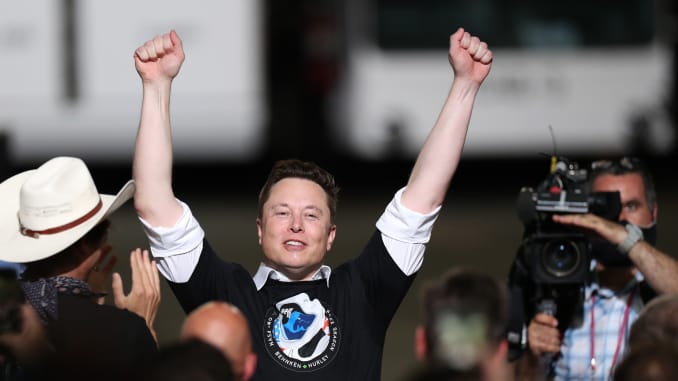
In a remarkable show of support, Tesla shareholders have ratified CEO Elon Musk’s colossal 2018 pay package, which was originally valued at up to $56 billion in Tesla stock.
This vote, coming just five months after a Delaware judge ordered the package to be rescinded, underscores the complicated and contentious nature of Musk’s compensation and leadership.
The Origin of the Pay Package
Register for Tekedia Mini-MBA edition 19 (Feb 9 – May 2, 2026): big discounts for early bird.
Tekedia AI in Business Masterclass opens registrations.
Join Tekedia Capital Syndicate and co-invest in great global startups.
Register for Tekedia AI Lab: From Technical Design to Deployment (next edition begins Jan 24 2026).
The story of Musk’s 2018 compensation plan began with an ambitious vision: to incentivize Musk to transform Tesla into one of the most valuable companies in the world. The package set twelve performance milestones, each tied to a $50 billion increase in Tesla’s market capitalization. If all goals were met, Musk would receive 20.3 million stock options in twelve tranches, ultimately granting him the potential to earn over $50 billion if Tesla’s market cap grew to $650 billion. At the time, Tesla’s market capitalization was around $59 billion.
However, the lavish pay plan quickly came under scrutiny, leading to a lawsuit. Critics argued that it was excessive and not properly aligned with shareholder interests. Concerns were raised about the independence of Tesla’s board members, who many believed were too closely aligned with Musk. Moreover, the process through which the package was approved lacked transparency, with shareholders not fully informed before voting on it.
The Legal Battle
In January 2024, Delaware’s Court of Chancery Judge Kathaleen McCormick invalidated the pay package, describing it as “unfathomable” and criticizing Tesla’s board for failing to act independently and negotiate at arm’s length with Musk. The court ruled that the board did not adequately disclose information to shareholders, thus undermining the integrity of the approval process.
Tesla shareholders voted to ratify the pay package in a move that, while not legally overriding the court’s decision, strengthens Musk’s position. The vote occurred during Tesla’s annual meeting in Austin, Texas, where 77% of voting shareholders expressed support for the compensation plan.
Musk’s Response and Tesla’s Trajectory
Following the announcement of the preliminary voting results, Musk took the stage with characteristic exuberance. “I just want to start off by saying hot d—! I love you guys,” he exclaimed, reflecting the palpable support from shareholders.
The vote came on the heels of a tumultuous year for Tesla. The company’s stock, despite a recent 2.9% uptick, remains down 27% for the year. Tesla is grappling with declining sales due to an aging lineup of electric vehicles and intensified competition in China.
The annual meeting also included votes on several other proposals, notably Musk’s initiative to move Tesla’s site of incorporation from Delaware to Texas. Shareholders approved the relocation, aligning the company’s legal base with its largest U.S. factory.
The Polymath and His Challenges
Musk’s far-reaching influence extends beyond Tesla. He remains CEO of SpaceX and Neuralink, and last year, he launched xAI, a new company focused on developing large language models and an AI chatbot named Grok. Despite these commitments, Musk assured Tesla shareholders of the company’s significant progress on vehicle autonomy, predicting that this technology could “10x the value of the company.”
He also outlined ambitions for a ride-hailing network populated with self-driving Teslas, likening it to an Airbnb model where owners could add or remove their cars from the fleet. Regarding the Cybertruck, Musk noted that deliveries are increasing, with a recent weekly record of 1,300 shipments.
In addition, Musk promised that Tesla would begin “limited production” of its humanoid robot, Optimus, in 2025, with plans to test the robots in its factories next year. He envisioned having “over 1,000, or a few thousand” Optimus robots working at Tesla in the near future.
Support and Opposition
While major institutional investors like BlackRock and Vanguard backed Musk’s compensation package, other significant investors, such as Norway’s $1.7 trillion sovereign wealth fund and the California State Teachers’ Retirement System, opposed it. They cited concerns over its size and structure, arguing that it was disproportionate and lacked proper alignment with shareholder interests.
The shareholder vote, however, does not resolve all corporate governance issues at Tesla. Dissatisfied shareholders could challenge the vote’s legality in Delaware, the same court that previously voided Musk’s 2018 compensation plan. In the ruling that voided the pay package, Musk was accused of using “strong-arm, coercive tactics” to secure votes for the compensation and relocation proposals, suggesting that the latest approval process may still face legal scrutiny.



